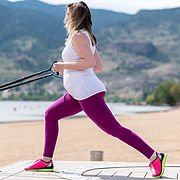After the long-awaited arrival of a newborn, the whirlwind of the postpartum period sweeps parents into a flurry of sleepless nights, diaper changes, and emotional roller coasters. In the midst of this beautiful chaos, many new mothers often find themselves wondering how they can regain their pre-pregnancy fitness and feel their best again. While exercise undoubtedly plays a crucial role in postpartum recovery, the significance of proper nutrition during this transformative journey cannot be overlooked. This article dives into the profound impact of nutrition on postpartum fitness, exploring the ways in which nourishing the body from within can help new moms rebuild their strength, restore energy levels, and instill a newfound sense of confidence. From replenishing essential nutrients to navigating dietary changes, join us as we unravel the fascinating interplay between nutrition and postpartum fitness, providing valuable insights and practical tips for embarking on this transformative wellness journey.
Table of Contents
- The Importance of Nutrition in Postpartum Fitness
- Nutritional needs for postpartum recovery
- Key nutrients for postpartum healing and replenishment
- Nutritional strategies for healthy and sustainable weight loss
- Optimizing energy levels and mental well-being through proper nutrition
- Q&A
- The Way Forward

The Importance of Nutrition in Postpartum Fitness
Maintaining a balanced and nutritious diet is crucial for postpartum fitness. After giving birth, a woman’s body goes through significant changes, both physically and hormonally. Nutritional choices during this phase play a vital role in promoting healing, fueling energy levels, and supporting overall well-being.
Here are some key reasons why nutrition is of utmost importance in postpartum fitness:
- Replenishing vital nutrients: Pregnancy and childbirth can deplete essential nutrients from a woman’s body. Consuming a diet rich in vitamins, minerals, and protein helps replenish these necessary elements and aids in the body’s recovery.
- Promoting proper healing: Adequate nutrition is crucial for wound healing, both internally and externally. A diet that includes foods with anti-inflammatory properties and nutrients like zinc and vitamin C can support tissue repair and reduce recovery time.
- Boosting energy levels: Caring for a newborn requires unmatched stamina. Nourishing oneself with nutrient-dense foods helps sustain energy levels, preventing fatigue and exhaustion.
- Supporting milk production: For breastfeeding mothers, nutrition plays a direct role in milk production and quality. Adequate hydration, along with a well-balanced diet, ensures ample supply and optimal nutritional value for the baby.
- Maintaining emotional well-being: Proper nutrition contributes to hormonal balance, aiding in postpartum mood stabilization. Certain foods, like those high in omega-3 fatty acids, can even have a positive impact on reducing postpartum depression symptoms.
In conclusion, paying attention to nutrition in postpartum fitness is imperative for a woman’s recovery, energy levels, and overall well-being. By making mindful choices and embracing a nourishing diet, new mothers can navigate this transformative period with vitality and confidence.

Nutritional needs for postpartum recovery
After giving birth, it is crucial for new mothers to prioritize their nutritional needs in order to support their postpartum recovery. A well-balanced diet helps replenish essential nutrients lost during pregnancy and childbirth, promotes healing, and provides energy for taking care of the newborn. Here are some key nutrients that are particularly important during the postpartum period:
Iron
Iron is crucial for replenishing blood lost during delivery and preventing anemia. Including iron-rich foods such as lean meats, leafy greens, nuts, and beans in your diet can help meet the increased iron requirements during this time. Pairing these foods with vitamin C-rich options like citrus fruits or berries enhances iron absorption.
Protein
Protein is essential for tissue repair and the production of breast milk. Include lean sources of protein such as poultry, fish, eggs, dairy products, or plant-based protein sources like tofu and legumes in your meals. Snacking on Greek yogurt or a handful of nuts can also provide a quick protein boost throughout the day.
Omega-3 Fatty Acids
Omega-3 fatty acids play a crucial role in brain development, both for you and your newborn if you choose to breastfeed. Incorporate fatty fish, like salmon or sardines, into your diet. Alternatively, consider vegetarian sources such as flaxseeds, chia seeds, or walnuts.
Fiber
Including fiber-rich foods in your diet can help regulate digestion and prevent constipation – a common postpartum discomfort. Whole grains, fruits, vegetables, and legumes are excellent sources of fiber. Just remember to increase your water consumption as well.
Remember, every person’s nutritional needs may vary, so listening to your body and consulting with a healthcare professional or registered dietitian is always beneficial. Prioritizing a well-balanced lifestyle and nourishing your body will go a long way in supporting your postpartum recovery journey.

Key nutrients for postpartum healing and replenishment
After giving birth, it’s important to provide your body with the essential nutrients it needs to heal and recover. Here are some key nutrients that can aid in postpartum healing and replenishment:
- Iron: Iron plays a crucial role in replenishing the blood lost during childbirth. Including iron-rich foods like spinach, beans, and lean meats in your diet can help prevent anemia and support healthy red blood cell production.
- Protein: Protein is essential for tissue repair and rebuilding after childbirth. Incorporate protein sources such as eggs, tofu, fish, and poultry into your meals. These foods also provide essential amino acids that promote tissue healing and recovery.
- Omega-3 fatty acids: Omega-3 fatty acids are known for their anti-inflammatory properties and can aid in postpartum healing. Incorporate foods rich in omega-3s, such as salmon, walnuts, and flaxseeds, into your diet to support tissue repair and reduce inflammation.
Furthermore, don’t forget to include a variety of fruits and vegetables in your diet to provide your body with essential vitamins and minerals. Stay hydrated by drinking enough water and consider incorporating herbal teas, like chamomile or peppermint, to promote relaxation and digestion.

Nutritional strategies for healthy and sustainable weight loss
Eating a balanced diet: One of the key is to focus on eating a balanced diet. This means including a variety of foods from all food groups: fruits, vegetables, whole grains, lean proteins, and healthy fats. Avoiding extreme and restrictive diets that eliminate entire food groups can help ensure you’re getting all the necessary nutrients your body needs.
Portion control: Another important aspect of successful weight loss is practicing portion control. It’s crucial to be mindful of how much you’re eating, as even healthy foods can contribute to weight gain if consumed in excess. Consider using smaller plates or bowls to help control portion sizes, and listen to your body’s hunger and fullness cues to avoid overeating.
Hydration: Staying hydrated plays a significant role in weight loss efforts. Drinking an adequate amount of water can help reduce cravings, boost metabolism, and increase energy levels. Aim to drink at least eight glasses of water a day and consider swapping sugary beverages for water or unsweetened drinks to minimize empty calories in your diet.
Regular physical activity: Incorporating regular physical activity into your weight loss journey is essential for both your overall health and sustainable weight loss. Engage in activities you enjoy, such as walking, swimming, or cycling, for at least 30 minutes a day, five days a week. Additionally, strength training exercises can help build muscle mass, which can increase your metabolism and aid in long-term weight management.
Mindful eating: Practicing mindful eating involves being present and fully engaged in the eating experience. Take the time to savor each bite, appreciating the flavors and textures of your food. This can help you become more in tune with your body’s hunger and fullness cues, preventing overeating and promoting a healthier relationship with food.
Seeking support: Lastly, don’t hesitate to seek support during your weight loss journey. Surrounding yourself with a supportive network of friends, family, or even joining a weight loss group or seeking guidance from a registered dietitian can provide you with the necessary encouragement and accountability to achieve your goals.
Optimizing energy levels and mental well-being through proper nutrition
Maintaining optimal energy levels and nurturing mental well-being is crucial in leading a healthy and fulfilling life. One of the key factors in achieving this balance is through the incorporation of proper nutrition into our daily routines. What we consume plays a significant role in how we feel physically and mentally, and making conscious choices can have immense positive impacts.
To optimize energy levels, it’s important to fuel our bodies with nutrient-dense foods. Incorporating a variety of fruits and vegetables into our diets provides essential vitamins and minerals that help boost our energy levels and support overall well-being. Additionally, including whole grains, lean proteins, and healthy fats not only satisfies our hunger but also provides sustained energy throughout the day.
Mental well-being goes hand in hand with proper nutrition. A diet rich in omega-3 fatty acids, found in fatty fish like salmon, walnuts, and flaxseeds, can promote brain health and reduce symptoms of anxiety and depression. Eating foods high in antioxidants, such as berries and dark leafy greens, can also support cognitive function and reduce the risk of mental decline with age.
To truly optimize energy levels and mental well-being, it’s crucial to stay hydrated. Drinking an adequate amount of water each day can help improve concentration, boost mood, and prevent fatigue. It’s important to remember that small changes in our eating habits and lifestyle can lead to significant improvements in our overall health and well-being. So let’s make mindful choices, fuel our bodies with the right nutrients, and nourish our minds for a vibrant and fulfilling life!
Q&A
What is the importance of nutrition in postpartum fitness?
Proper nutrition is essential for postpartum fitness as it provides the necessary energy and nutrients to promote healing, support breastfeeding, and aid in weight loss. A balanced diet can also help to prevent postpartum depression and boost mood and energy levels.
What nutrients are particularly important during the postpartum period?
During the postpartum period, it is crucial to focus on consuming adequate amounts of protein, iron, calcium, and omega-3 fatty acids. These nutrients support tissue repair, promote strong bones, and aid in hormone regulation.
Can nutrition impact postpartum weight loss?
Yes, nutrition plays a significant role in postpartum weight loss. A balanced diet, consisting of lean proteins, whole grains, fruits, and vegetables, can support healthy weight loss by providing the necessary nutrients while maintaining a calorie deficit.
Are there any foods that should be avoided or limited during the postpartum period?
Some foods, such as processed snacks, sugary drinks, and excessive caffeine, should be avoided or limited as they provide empty calories and can hinder weight loss efforts. Additionally, breastfeeding mothers should be cautious with certain foods that may cause digestive issues in their babies.
What strategies can help maintain a healthy diet during the postpartum phase?
Planning meals and snacks in advance, focusing on nutrient-dense foods, staying hydrated, and incorporating regular physical activity can all contribute to maintaining a healthy diet during the postpartum phase. Having a support system and seeking guidance from a healthcare professional can also be beneficial.
How long should one follow a postpartum nutrition plan?
The duration of a postpartum nutrition plan may vary depending on individual goals and circumstances. However, it is generally recommended to follow a nutrient-rich diet until the body has fully recovered, which can take up to six months or longer.
The Way Forward
As we bid adieu to this insightful exploration of the role of nutrition in postpartum fitness, we are reminded of the power we hold in our hands, the power to nurture not just our little ones, but also ourselves. The journey of motherhood is undoubtedly a glorious and transformative one, and with a little extra care and attention to our nutritional intake, we have the ability to unlock a world of vitality and strength.
In this captivating journey, we witnessed the interplay between nutrition and postpartum fitness, as they danced harmoniously in the pursuit of wellness. From nourishing our bodies with wholesome, nutrient-rich foods to understanding the magical properties of certain vitamins and minerals, it became evident that our plates hold the key to our postpartum triumphs.
Through the kaleidoscope of knowledge, we marveled at the vital role that macronutrients play in replenishing our energy levels and rebuilding muscles – the intricate threads that connect the dots of our fitness journey. Protein, the mighty hero, tirelessly repairs, strengthens, and rebuilds; carbohydrates fuel our bodies, enabling us to conquer the demands of motherhood with grace and poise, while healthy fats act as nurturing guardians, protecting us from the storms that may lie ahead.
With every expert insight and research-backed revelation, we journeyed deeper into the world of micronutrients, the unsung heroes that quietly orchestrate the symphony of our bodily functions. We discovered the incredible impact of vitamins, like the immune-boosting vitamin C and the bone-nourishing vitamin D, as well as the miracle workers known as minerals, such as iron and calcium – champions that safeguard our bodies from depletion and fatigue.
But this tale of nutrition and postpartum fitness would be incomplete without acknowledging the importance of self-care, compassion, and balance. For as we nourish our bodies, we must also tend to our emotional and mental well-being, embracing patience, self-acceptance, and embracing the ebbs and flows of our postpartum journey.
So, as we conclude this captivating chapter, we leave armed with the wisdom that lies within our grasp - the power to transform, evolve, and flourish as we navigate the remarkable world of postpartum fitness. Let us embark on this adventure, equipped with the nourishing elixir of knowledge, creating a symphony of strength, resilience, and harmony. Together, we can seize the opportunity to reclaim our bodies, savor the joys of motherhood, and unleash our full potential as the incredible women we are meant to be.
As an affiliate, my content may feature links to products I personally use and recommend. By taking action, like subscribing or making a purchase, you’ll be supporting my work and fueling my taco cravings at the same time. Win-win, right?
Want to read more? Check out our Affiliate Disclosure page.